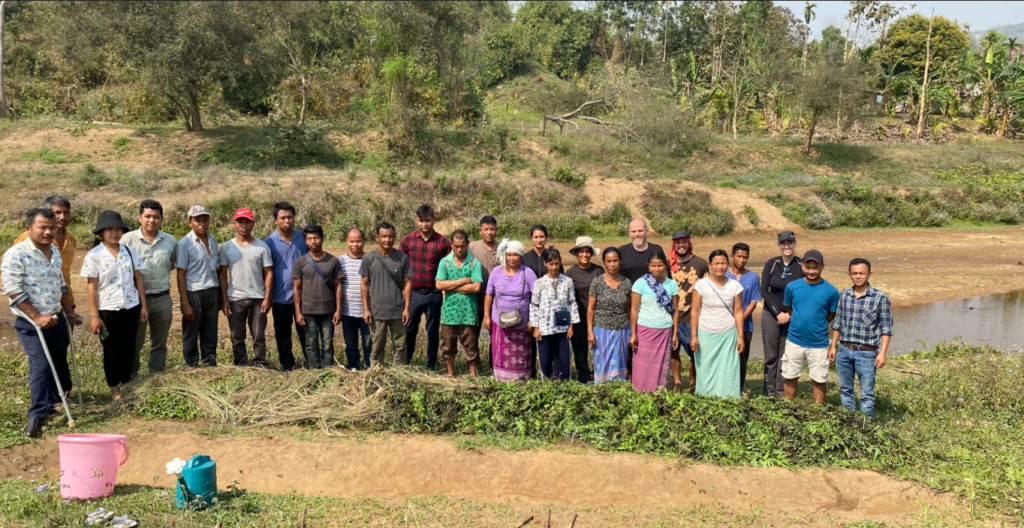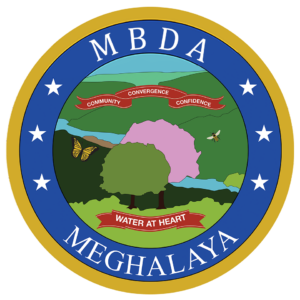Land Restoration Training Programs offered by Sadhana Forest
This program is supported by CLLMP (Community Led Landscape Management Project), a project of the State of Meghalaya supported by the Government of Meghalaya and World Bank.
About us
Sadhana Forest is an organization dedicated to rehabilitating ecosystems, reforestation, food security, water conservation and sustainable living. It started in December 2003, in Tamil Nadu, and has since grown to four countries. In all locations, Sadhana Forest facilitates long-term change to benefit local ecosystems and people.
In Meghalaya, Sadhana Forest will provide training in simple, practical, efficient, and cost-effective techniques that are appropriate to the specific needs of the local environment and people.
About the training
These trainings will equip participants with the knowledge and implementation of various techniques linked to water conservation, reforestation, nursery and organic farming techniques. Our training programs are designed to enable participants to gain practical knowledge that they would be able to instantly implement. All training sessions will be conducted outdoors. During the training all the participants will implement all techniques learned by physically digging, planting, etc.
Trainings are available weekly Monday to Friday from 10am to 4pm. Please apply in advance following the relevant link below.
About the locations
The 3 Immersion Centers are located at Daribokgre (Samanda Block, East Garo Hills), Wahmawpat village (Mawsynram Block, East Khasi Hills) and Moolamylliang (Saipung Block, East Jaintia Hills).
About the modules
1. Soil Moisture Conservation –
Trainees will learn the principles of watershed management, the process of design, the choice of specific techniques and the implementation. Emphasis will be put on quality assurance and long term viability of all water conservation structures. The trainings will include survey of the contours (topography) of the land with an A-Frame or Tube Level. They will span design of water runoff control and soil erosion measures such as on-contour swales, bunds, earth dams, check dams, gabions, catchment ponds, percolation ponds, etc. Trainees will construct water runoff control and soil erosion measures, including marking the land, digging (manually or with a JCB, or other earth moving equipment), seeding nitrogen-fixing plants, mulching, planting and maintenance. They will learn how to construct masonry dams (emphasis on correct proportions between dam wall and apron). Trainees will also learn how to install metal cage gabions in waterways, etc.
2. Reforestation –
The training will explore the importance of biodiversity, choice of species along with the determination of criteria for selection of species. Trainees will be instructed on consideration of altitude, temperatures, rainfall, wind, and soil. There will also be an emphasis on integration of tree planting with water conservation measures. Tree planting techniques (use of Biochar, Effective Microorganisms, compost tea, etc.) and technologies (Groasis – Waterboxx, Land Life – Cocoon) will be covered, along with watering techniques such as wick irrigation bottles and drip irrigation systems. The trainees will be shown the principles of tree spacing according to species, soil and climatic conditions, as well as diagnosis of common plant conditions.
3. Nursery –
This training will instruct participants on the choice of location, taking into consideration the availability of water, the required intensity of sunlight, wind directions, etc. Participants will learn about:
a) Different nursery growing techniques like bag nursery, air root pruning, or raised bed nursery for bare rooted plants. b) Preparation of soil for the bags according to the needs of the species to be propagated in them, like acidity, availability of nutrients (Nitrogen, Phosphorous, Potassium, etc.), texture (loam, sandy loam or clay). c) Determining Seed Dormancy Type and the treatments to overcome dormancy and enhance germination like cleansing, scarification, soaking, smoke treatments, stratification techniques, etc. d) Watering, aftercare, and extraction and transportation of seedlings.
4. Organic Farming –
This training module will explore simple and affordable techniques to examine soil conditions and methods to improve soil quality. Participants will be trained in the preparation of compost, raised beds as well as the preparation and use of biochar. They will be instructed in mulching, watering practices, crop rotation and companion plants and – additionally – the prevention and management of pests.
To apply for the training program in East Garo Hills, click here.
To apply for the training program in East Khasi Hills, click here.
To apply for the training program in East Jaintia Hills, click here.




